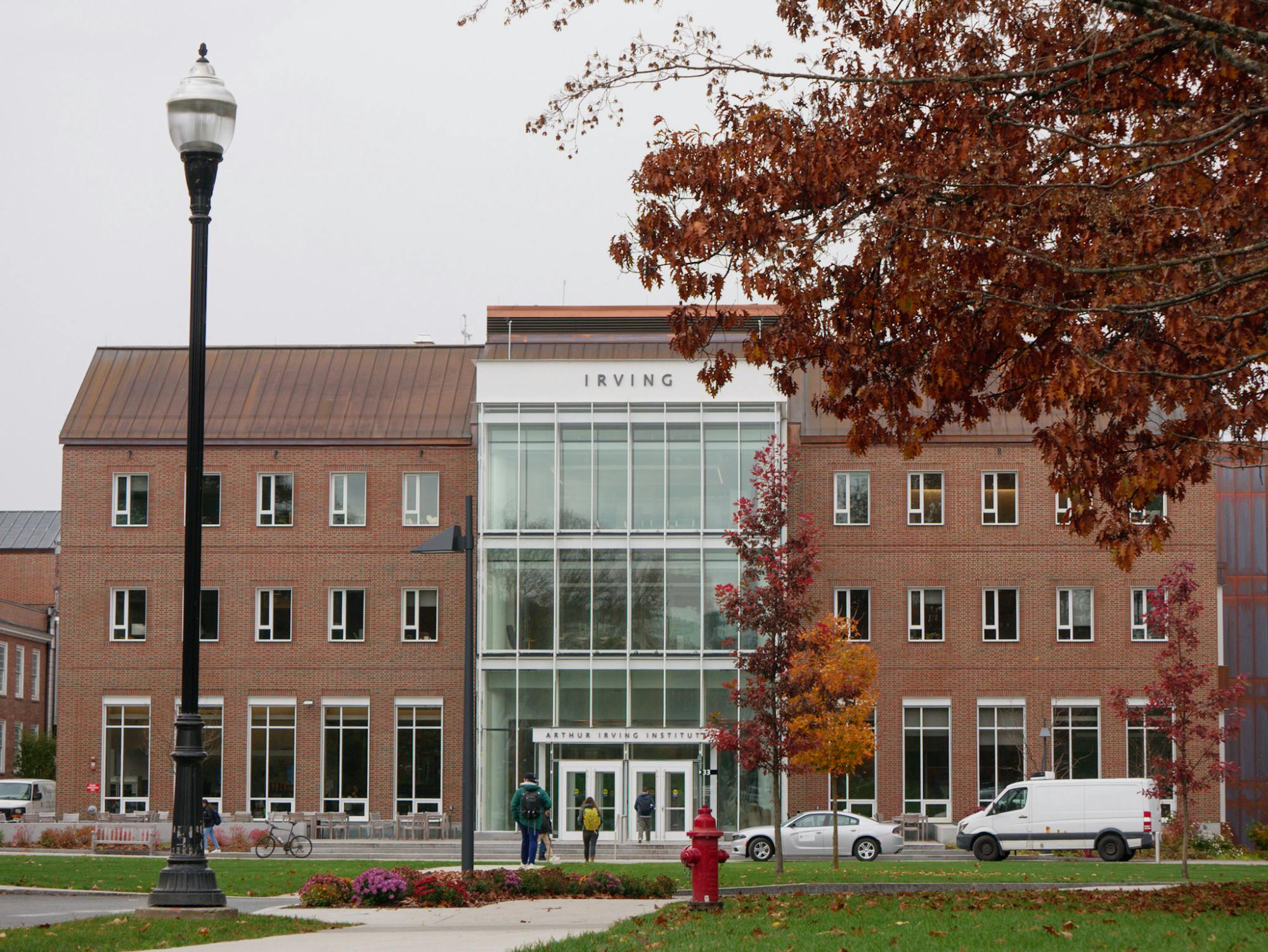Sunrise Dartmouth released the “Dartmouth New Deal” last Friday, a document which two student protestors — Roan V. Wade ’25 and Kevin Engel ’27 — distributed to the College administration before their Oct. 28 arrest by Hanover police.
The 14-page document covered topics ranging from Dartmouth’s alleged complicity in the war in Gaza, the College’s need to make reparations to Native students and the push for a College-funded transit system throughout the Upper Valley.
The Dartmouth New Deal called for the College to respond to its list of demands by the first day of winter term: Jan. 3, 2024. Wade — who is also Sunrise Dartmouth’s hub coordinator — said the formation of the document was a collaborative effort by many student organizations that began last winter.
Wade acknowledged that “there is criticism [that] what we’re doing doesn’t seem realistic.”
“A lot of the time, when we determine what we ask for by the status quo, we will never achieve a just society,” Wade said. “What we are doing is outlining based on what we feel we need, not based on how likely it is the administration will meet those needs.”
Dartmouth’s Alleged Involvement in Military and War
The first point of the document demands “divesting the College’s endowment from all organizations that are complicit in apartheid and its apparatuses” by following the recommendations of the 2022 Amnesty International Report on Israel Apartheid. The group has not released specifics of how they want Dartmouth to divest.
“We are working on publishing further documentation for clarification,” Wade said.
“It’s not a comprehensive list,” Engel said.
Similarly, point 24 in the document demands Dartmouth “phase out Reserve Officers’ Training Corps programs on campus” in order to “cut all ties with the military industrial complex” and “completely divest from any companies profiting off war, ban military contractors from advertising or recruiting on campus.”
ROTC is a military training program and elective taken by university students nationwide that allows them to receive “full tuition or room and board and an allowance for living expenses,” as stated on Dartmouth’s website under Student Affairs. Upon graduation, students who have completed the program are commissioned as second lieutenants in the U.S. Army or National Guard.
Dartmouth and Climate Change
Point two and point 10 demand the College mitigate its carbon footprint, a subject which President Beilock previously addressed during her Sept. 22 inaugural address.
Though Beilock highlighted the College’s “aggressive push” towards achieving carbon zero on campus and committed to “roll out specific and aggressive targets for 2030 and 2050,” Sunrise Dartmouth calls for the College to reach this goal by 2030.
Point nine requires the College “create green, well-paid union jobs accessible to both Dartmouth and non-Dartmouth affiliated community members to facilitate a transition to carbon neutrality.”
Rounding out the climate demands, point 19 stipulates that the College consult “local Native people, people of color and students and alumni from countries most affected by climate change,” when structuring plans for Dartmouth’s sustainability goals.
Dartmouth’s Relationship to the Native Community
The document calls for the College to make “reparations for Native American students,” and begin discussing returning land in the Second College Grant back to Native people by the end of the 2023-2024 academic year. The Dartmouth New Deal also asks the College to make taking a class in the Native American and Indigenous studies department a graduation requirement.
The Second College Grant, which spans nearly 27,000 acres, also includes three rental cabins maintained by the Dartmouth Outing Club and eight additional cabins for the use of Dartmouth-affiliated individuals, according to the DOC website.
Employment at Dartmouth
In points four and 25, Sunrise Dartmouth advocated for changes to the College’s employment policies. The Dartmouth New Deal calls for a roughly 29% wage increase for all student workers, from $16.25 to $21 an hour. Additionally, the document stipulates that the College should institute “mental health and sick pay for every student worker.”
Asian American Studies Program at Dartmouth
The document advocates for the addition of a standalone Asian American Studies program and minor and the establishment of a permanent, on-campus Pan-Asian house and community space that is comparable to pre-existing community houses on campus, such as the Latin American, Latino and Caribbean House, the Native American House and Triangle House.
In 2021, seven members of the Dartmouth Asian American Student Collective created a petition titled “A Call for Asian American Studies at Dartmouth” similar to that of the Dartmouth New Deal. In 2001, seven Dartmouth professors created a list of proposals for the College to establish an Asian American program, according to the New York Times.
Diversity at Dartmouth
Points six, seven, 13 and 21 are concerned with diversity across the student body and faculty of the College.
The document calls for “significantly increasing numbers of faculty of color across all offices and departments until parity is reached with the proportion of students of color,” emphasizing the need for diversity among tenure and tenure-track professors. According to past reporting, only 22% of tenured faculty are people of color.
Additional demands include the replacement of the 24 members on the Board of Trustees with faculty-student-staff councils, the abolition of both legacy status as well as demonstrated interest in the undergraduate and graduate admissions process and the establishment and publication of an annual diversity survey for students of color and queer students.
“In this document, we’re calling for a re-envisioning of Dartmouth,” Wade said. “We believe that there needs to be further conversations, and we need to center Palestinian liberation and decolonization within how we envision Dartmouth.”
Financial Aid
The Dartmouth New Deal calls for financial aid covering living costs during leave terms — including covering the costs of housing, food and “emergency costs.” The document also wants financial aid that covers all costs related to study abroad programs — including Language Study Abroad, Foreign Study Programs, exchange programs and transfer terms.
The College’s current policies covering on-campus leave terms state that no scholarships or loans can be provided during these terms and that the student is responsible for covering housing and associated meal plan costs.
According to the College’s financial aid website, students studying abroad who receive need-based financial aid receive scholarship assistance to cover costs in excess of those of a typical term, and their expected family contribution remains the same as a term on campus. Students that normally work during the term have their normal income covered by scholarship funding for programs that span the entire term.
Student Wellness
The three points which relate to student wellness discuss food and housing insecurity during interim and leave terms, metrics for a work-life balance and additional reforms to time away policies.
The Dartmouth New Deal demands a fully-funded food pantry to which students and community members can have access, allowing campus residents to opt out of dining plans, providing grocery stipends to students who receive financial aid, lowering the cost of housing and granting students protections afforded to regular tenants under local, state and federal law during the six-week “winterim” period.
The document further calls for students to be allowed to take an increased number of two-course terms — the current policy only allows for three terms. In addition, the document demands a widening of the time range in which classes are offered to include night time slots, arguing that this might improve work-life balance for students.
The document asks that the College guarantee “housing security, food security and all privileges afforded to students taking leave terms” for students taking time away, as well as a greater level of autonomy for students taking mandatory time away for medical reasons.
Upper Valley Transit System
In the document, Sunrise Dartmouth asks that the College fully fund the expansion of the public transit system in the Upper Valley. It also requires the College to engage with Advanced Transit and promise increased financial support, because AT is presently funded by “Upper Valley towns, Dartmouth College and the Dartmouth Health,” according to their website.
At present, the Upper Valley Advanced Transit operates six routes, including one commuter, two shuttles and one on-demand service, with all 10 services running from Monday to Friday and some running on Saturdays, according to the Advanced Transit website.
Moving Forward
If the Dartmouth administration does not respond with a comprehensive plan to meet the demands by Jan. 3, 2024, Sunrise Dartmouth stated they will resort to “physical action” as outlined in the Dartmouth New Deal. In her email to the College following the arrest of Engel and Wade, President Sian Beilock said that this threat prompted the administration to involve the Hanover Police.
Engel and Wade disagreed with the College’s interpretation of the phrase “physical action” in their recent statement in The Dartmouth.
“I think it is really important to emphasize that Sunrise is a completely nonviolent organization,” Wade said. “Physical action is something that all activists do in terms of, you know, forcing things to be visibly present. By sitting in a tent, we were taking physical actions. By hosting a vigil, by hosting a protest, by doing literally anything that is not on social media — that’s taking physical action.”
The pair said they had no idea the College found their actions threatening until Beilock’s email the next day. Even if they were to threaten violence, Engel said he didn’t think the administration’s response was warranted.
“Even if we were to consider physical action — a quote which was taken from the 2014 Freedom Budget — to mean violent action, I do not believe that the way they behaved was appropriate,” Engel said.
The document requires the administration to provide a timetable for when they will respond to each demand. The Sunrise Movement insists that any financially-related demands must be included in the fiscal budget by the 2024-2025 school year.

Alesandra Gonzales is a reporter, photographer, and videographer for The Dartmouth from south Texas, majoring in psychology with a minor in film. Outside of The D, she likes to workout, watch The Ranch, and do EMS work. She is a licensed EMT in three states.




